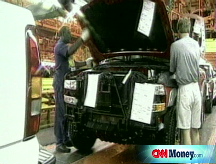What Detroit should do in '09 and beyond
Here are a few belated New Year's resolutions for the beleaguered automakers.
NEW YORK (Fortune) -- It looks like the annual Detroit auto show won't be the wake next week that everybody is expecting.
Although there will be fewer parties, banquets, and made-for-TV new model reveals, there are expected to be just as many journalists attending as in years past. And since everybody now knows what terrible shape the auto companies are in, the writers and TV correspondents will be looking for a new angle.
It will be a great opportunity for automakers drop their spiel about cars that are longer, lower, and wider and instead engage in a serious conversation about Issue Number One: Why they deserve public support and what they are doing to ensure their long-term survival.
Here are some modest suggestions:
For GM's Rick Wagoner: Start sounding like you are part of the solution instead of part of the problem. You were one of the revolutionaries who overthrew GM's old guard in 1992, yet for too long you've sounded like part of the old guard yourself, more intent on calming the organization and executing your plan than in radical change. Unfortunately your plan has cost GM and its shareholders more than $72 billion in the last four years, which should tell you that you aren't doing something right.
Your first constructive step should be to explain in detail how GM will be doing things differently as a corporation and not just as a factory that turns out new models. Give us an idea of you can squeeze more mileage out of your surviving brands, revive your fading fortunes in China, reach a sustainable agreement with the United Auto Workers and button up the Delphi bankruptcy once and for all.
For Ford's Alan Mulally: Your company has been acting as if the problems that afflict your other domestic competitors - dismal sales, excessive reliance on trucks, uncompetitive wages, too many dealers, dying brands - don't apply to you. Enough already!
Yes, you were smart to borrow a lot of money two years when credit was still available. And yes, your earnings have yet to take the catastrophic hit that GM's have. But don't forget: GM has a history of going into a downturn a year earlier than Ford, so hold your fire on that one.
And by the way, some experts believe that Ford is thin on management talent, thin on technology, and thin on new product cadence, so let's wait and see how this plays out too before patting ourselves on the back. The last time Ford tried to separate itself from its cross-town competitors was in the mid-1990s when Alex Trotman was chief executive. Trotman was succeeded by Jacques Nasser, and we know how that story ended.
For Chrysler's Bob Nardelli: You deserve credit for your prompt attention to your company's cost structure as sales have declined - painful as that has been - as well as your consistent communications with employees and stakeholders.
But if Chrysler has any future as an independent company, you need to make that case more strongly. To most observers, Jeep, minivans, and Dodge trucks are the only Auburn Hills assets worth saving. On their own, they can't support the dealer network of a full-line manufacturer, and their value can only be realized by sale to an outside buyer.
You could get some serious help if Steve Feinberg, the publicity-shy head of Cerberus, your private equity owner, would come forward with an explanation of his plan for Chrysler and Chrysler Financial. Some of this will no doubt leak out as you go back to the Obama administration for future financial aid, so why not get a jump on it first?
So gentlemen, if you want to keep all those journalists in town next week from hanging black crepe on your industry, the best way is to indulge in an adult discussion about what you've learned in the past 12 months - and how you plan to apply it going forward. ![]()
-
 The retail giant tops the Fortune 500 for the second year in a row. Who else made the list? More
The retail giant tops the Fortune 500 for the second year in a row. Who else made the list? More -
 This group of companies is all about social networking to connect with their customers. More
This group of companies is all about social networking to connect with their customers. More -
 The fight over the cholesterol medication is keeping a generic version from hitting the market. More
The fight over the cholesterol medication is keeping a generic version from hitting the market. More -
 Bin Laden may be dead, but the terrorist group he led doesn't need his money. More
Bin Laden may be dead, but the terrorist group he led doesn't need his money. More -
 U.S. real estate might be a mess, but in other parts of the world, home prices are jumping. More
U.S. real estate might be a mess, but in other parts of the world, home prices are jumping. More -
 Libya's output is a fraction of global production, but it's crucial to the nation's economy. More
Libya's output is a fraction of global production, but it's crucial to the nation's economy. More -
 Once rates start to rise, things could get ugly fast for our neighbors to the north. More
Once rates start to rise, things could get ugly fast for our neighbors to the north. More








